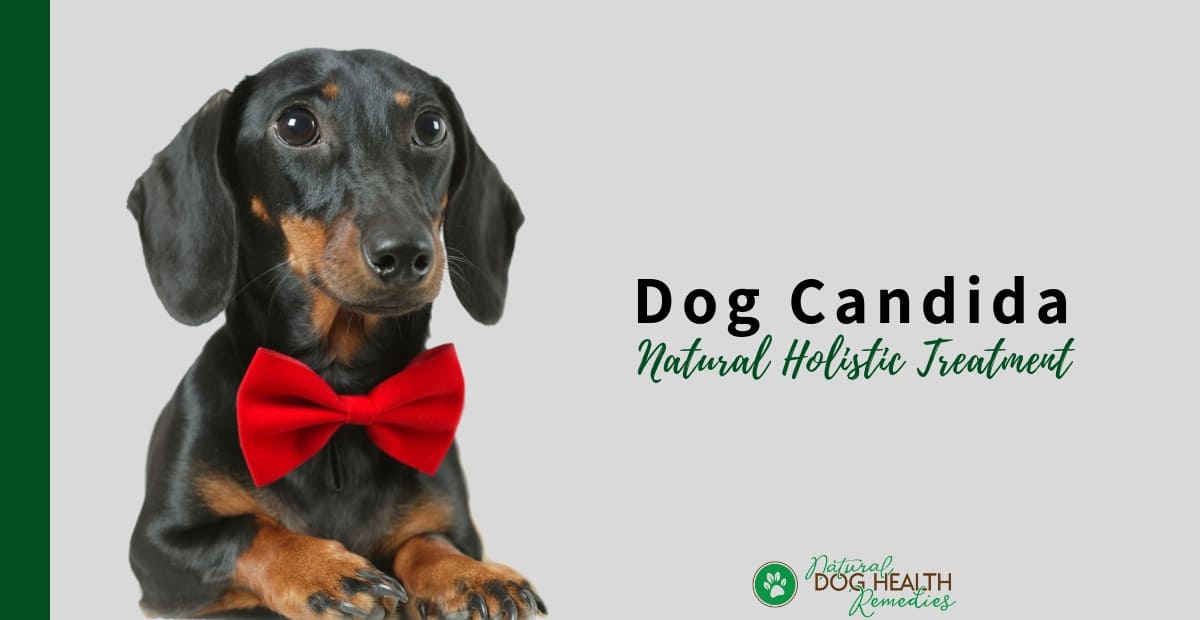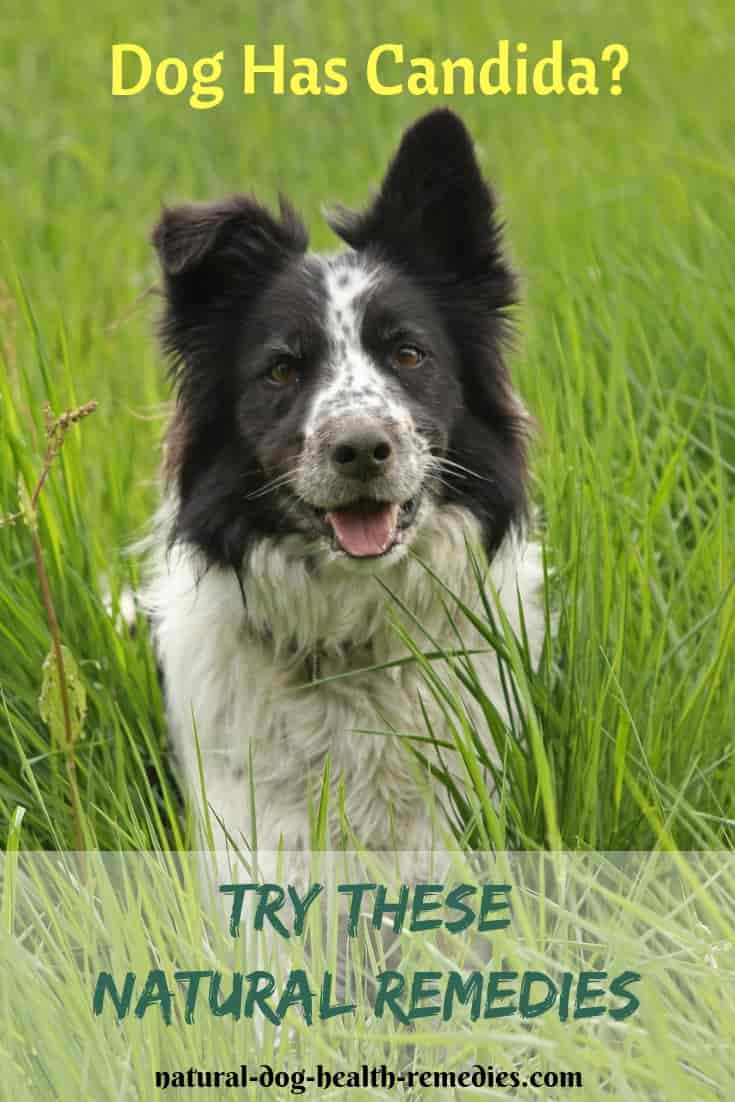Dog Candida Remedies
(FTC Disclosure: If you make a purchase via a link on this page, I may receive a small commission, at no added cost to you.)

Overview
If your dog is suffering from recurring yeast infections and you are wary of constantly giving your dog antifugal medications, please consider trying using natural remedies to tackle the problem.
It will take longer than conventional medicines to see results, but be patient and you will be surprised to see the difference in your dog!
This page will show you how to use natural remedies internally to treat yeast infections in dogs from the inside out. (For topical natural treatment, please see this page.)
Natural remedies such as herbs, enzymes, vitamins and supplements can help address and correct the underlying causes of this difficult-to-cure dog health problem.
However, to make sure that the natural dog candida remedies work effectively, a step-by-step action plan with proper timing is necessary.

Important!
Before Treating Your Dog with Candida
Before starting treatment with any natural dog candida remedies, check the dog's thyroid levels first to rule out hypothyroidism.
Many holistic vets believe that there seems to be a direct connection between dog yeast infections and hypothyroidism.
If your dog has hypothyroidism, treating the disease will eliminate the root cause of his yeast infection - this happened to my dog Hana - she had recurring skin yeast infections and secondary bacterial infections, and all her skin problems went away after being treated for hypothyroidism.
Also, since drugs like steroids and vaccines can weaken the immune system thereby causing dog candida, consult and work with a holistic vet who is more open to the use of other treatment options than strong drugs such as steroids that can compromise the immune system.
A Step-By-Step Guide to
Treating Dog Candida Naturally
Below are the steps that you need to take to help get rid of your dog's yeast infection holistically.
Step 1 - Proper Diet
One of the most important natural dog candida remedies is proper diet. In fact, if your dog has yeast infections that affect many parts of his body, the first thing to do is to address his diet. This will help restore and maintain a healthy flora level in the body and reduce the population of Candida albicans in your dog.
Since yeast thrives on sugars, an anti-yeast diet should be meat-based, sugar-free, grain-free, and starch-free. Your dog should not be allowed to eat any form of sugars, including honey, corn syrup, and even white or sweet potatoes. Also, high-glycemic vegetables (such as sweet potatoes, corn, carrots) should be avoided.
Some examples of a very healthy, natural, and organic diet suitable for dogs with yeast infections (actually, it is good for dogs with or without yeast infections!):
*For added benefit, organic coconut oil can be added to the dog food (1 teaspoon coconut oil per 10 pounds of body weight).
Coconut oil is rich in fatty acids which are capable of destroying yeasts and other bad micro-organisms without upsetting the gut flora. The oil is also good for dogs suffering from leaky gut syndrome, because it speeds the healing of perforations in the intestinal wall.
Step 2 - Use Supplements and Herbs to Combat Yeasts
The next important dog candida remedy is using herbs and dietary supplements that have anti-fungal properties to combat yeasts and control yeast overgrowth.
Herbs and supplements that are helpful include:
- Pau d'arco: The inner bark of this South American tree is effective against fungi and yeasts. In addition, it has also been shown to have anticancer activity.
- Rosemary and Thyme: The oil extracts of these herbs also have strong antibacterial and antifungal properties.
- Caprylic Acid: This is a medium chain fatty acid found naturally in, among other things, coconut oil and palm oil and is known to have anti-fungal, anti-bacterial and anti-viral properties.
- Undecylenic Acid: This is an organic unsaturated fatty acid that is derived from castor oil and is a natural fungicide.
Check Out This Product
It contains the above ingredients and more and is an excellent blend of natural antifungal herbs, vitamins, minerals, etc. for anti-candida intestinal support.
Recommonded dosage for dogs is one to two capsules daily with meals, but obviously the exact dosage for an individual dog differs depending on the size and condition of the dog.
If possible, work with a holistic vet to work out a treatment protocol for your dog.
In addition to herbs, digestive enzymes (such as Prozyme) should be added to the dog's food as a dietary supplement.
Enzymes are essential not only for food digestion and absorption, but also for helping to cleanse dangerous free radicals and toxins from the dog's body, so they play a very important role in fighting yeast infections in dogs.
However, enzymes are extremely unstable and are very often destroyed during food processing. To ensure that there are sufficient enzymes to remove toxins the dog's body, it is necessary to supplement the diet with digestive enzymes.
Step 3 - Strengthen the Immune System
In addition to the above candida remedies to eliminate fungal growth, we also need to strengthen the dog's immune system. Immune-boosting herbs such as Oregon grape or echinacea are effective.
Furthermore, probiotics should be added to the dog's food in order to help re-establish the "friendly bacteria" environment in the dog's digestive system.
However, proper timing is important.
First, we have to reduce the candida population (by taking the above steps).
Then, two weeks after that, beneficial bacteria can be effectively added to the system.
The Final Step - Detoxification
 Using the step-by-step action plan above works, but it takes time (weeks and sometimes months depending on the physical conditions of the patient).
Using the step-by-step action plan above works, but it takes time (weeks and sometimes months depending on the physical conditions of the patient).
Moreover, very often, the symptoms of the dog patient may appear to worsen after the initial treatment. The dog may also exhibit some flu-like signs and symptoms such as diarrhea, nausea and vomiting, weakness, and body pain. This is normal.
The reason? When large numbers of yeasts are being killed off, they do not just disappear - their physical remains as well as the accompanying toxins are still in the dog's system.
These toxic substances and remains may be too much for the dog's body to handle, and it takes time for the body to gradually eliminate such toxins. While the body is working hard to eliminate the toxins, the dog may show worsening symptoms such as itching or skin flare-ups.
At this final stage, it is important to supply the dog's body with systemic enzyme supplements which help significally during detoxification. They circulate in the blood and break down inflammation and digest dead candida cells.
A Good Systemic Enzyme Product
This supplment contains amylase, protease, bromelain, and other digestive enzymes which support healthy digestion of fats, carbohydrates, and proteins.
Given between meals, this supplement will help in the reduction of inflamation systemically and detoxify the body.
In addition, the dog's liver, being a major toxin-removal organ, needs additional support in this final stage of detoxification.
A Good Product for The Dog's Liver
This supplement contains a synergistic blend of enzymes, herbs, vitamins, prebiotic and probiotics and antioxidants. Together these powerful ingredients work to help eliminate toxins, strengthen immunity and stimulate healthy liver function.
To Recap ...
If your dog suffers from recurring infections of the skin, ear, or urinary tract, chances are these infections are caused by an underlying root problem - yeast infection.
However, very often, conventional veterinarians fail to see the "big picture" and, instead of eliminating the root cause, simply prescribe drugs to get rid of the secondary problem or problems.
Natural dog candida remedies are safe and they address the root problem and so you can see good and long-term results. Good luck!
ReferencesC.J. Puotinen, Natural Remedies for Dogs and Cats (Keats Publishing, 1999).
M.L. Wulff-Tilford and G.L. Tilford, Herbs for Pets (Bowtie Press, 1999).
M. Goldstein, The Nature of Animal Healing (Ballantine Books, 2000).
R.H. Pitcairn, The Complete Guide to Natural Health for Dogs and Cats (Rodale, 2005).
Recurring Ear Infections?






